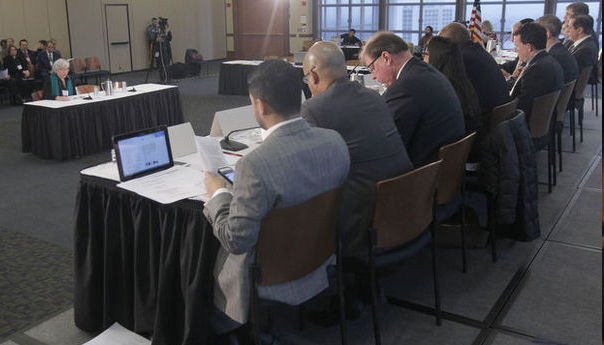New Jersey Governor At It Again

A proposed new tax on electronic cigarettes was the burning topic today at the first legislative committee meeting of the state budget season.
Gov. Chris Christie’s budget proposal, delivered last month, suggests raising taxes on the “e-cigarettes” to the regular rate for cigarettes — which is $2.70 per pack — saying they’re “unregulated and subject to standard State sales taxes only.”
But at the state Assembly Budget Committee’s meeting today at Montclair State University, Steven Clark — a Union City resident who said he quit smoking regular cigarettes a year ago thanks to e-cigarettes that provide nicotine through liquid vapor instead of smoke — called the idea of raising taxes on them “reckless and harmful.”
“Electronic cigarettes have the potential to make smoking obsolete within a generation,” Clark said. “With the right combination of tailored regulation and cost-incentives, e-cigs might end smoking as we know it.”
Clark said he’s a member of Consumer Advocates for Smoke Free Alternatives, a pro e-cigarette advocacy group, but that he’s not speaking on its behalf. He said the group is not funded by the e-cigarette industry.
Because the products are so new, there is not much data on their safety. According to a Feb. 28 press release from the Center for Disease Control and Prevention (CDC), e-cigarette vapor has “far fewer of the toxins found in smoke compared to traditional cigarettes,” but “the impact of e-cigarettes on long-term health must be studied” and “research is needed to assess how e-cigarette marketing could impact initiation and use of traditional cigarettes, particularly among young people.”
CDC Director Tom Frieden said nobody knows at this point “whether they will decrease or increase use of traditional cigarettes.”
Mark Anton, a Flanders resident who owns company that imports and sells e-cigarettes, said he plans to begin manufacturing the liquid nicotine for the products soon. But if the tax kicks in, he said, he’d open the manufacturing facility in Pennsylvania instead.
“We would be forced to compete with states that do not have such a tax in place,” he said.
The opponents of the tax – five in all — had a sympathetic ear in the committee’s chairman, Assemblyman Gary Schaer, a smoker for more than 40 years.
“You’ll forgive me as I hold my own e-cig in my hand,” Schaer (D-Passaic) said. ‘I will admit to you that after having gone through every anti-smoking possibility… it’s something which I will agree with you has given me some small modicum of help and, more importantly, it’s given my wife and kids some modicum of health.”
Assemblyman John Burzichelli (D-Gloucester) said the state Treasurer estimates the tax would generate $35 million in revenue annually but that the administration has often been “creative” in its estimates.
Other concerns raised at the budget committee included how the state funds higher education, increasing college financial aid, how the state does not meet the school funding formula, services for the autistic, and a cut in Charity Care funding for hospitals and a reduction in NJ Transit funding.
Sister Patricia Codey — the president of Catholic HealthCare Partnership of New Jersey and sister of state Sen. Richard Codey (D-Essex) — said it makes no sense for the state to cut $25 million from the Charity Care program, while giving the same amount to University Hospital in Newark, which was set to lose more than $23 million funding under the Charity Care formula.
“Why should every hospital in the state be subject to the Charity Care formula and University Hospital be given special treatment at the expense of other safety net providers. Is this fair?” Codey said.
Montclair State University President Susan Cole said she’s thankful for an infusion of borrowed money to help schools build infrastructure, but called the way the budget distributes higher education funding “appalling.”
“There are huge inequities in how the campuses are treated with no rationale whatsoever, and there continues to be appropriation without policy,” Cole said. “This is a situation I have talked to you about for a number of years, but unfortunately we are still there.”
Joan Migton, a parent of an autistic daughter and member of the Supportive Housing Association of New Jersey, urged the committee to increase funding for “shelter workshops” where the developmentally disabled can do contract work for businesses. Migton said the workshop her daughter attends needs more funding, and she’s afraid the state will eventually stop paying for them because they’re not eligible for federal Medicaid dollars.
“Sheltered workshops offer individuals with disabilities a safe environment where they can be productive and do actual contract work for local businesses,” Migton said. “A well run workshop is an appropriate setting for my daughter who has some work skills but does not know how to keep herself safe in a public workplace and could wander off with anyone.”
David Peter Alan, who chairs the Lackawanna Coalition — a transit rider advocacy group — said the proposed budget cuts NJ Transit by $13 million.
“The riders have to make that up, either through increased fares or transit cuts,” Alan said, adding that it’s particularly unfair after riders endured a 25 percent fare increase in 2010. “We believe it was unfair to do that, to single out transit riders to pay so much more.”
